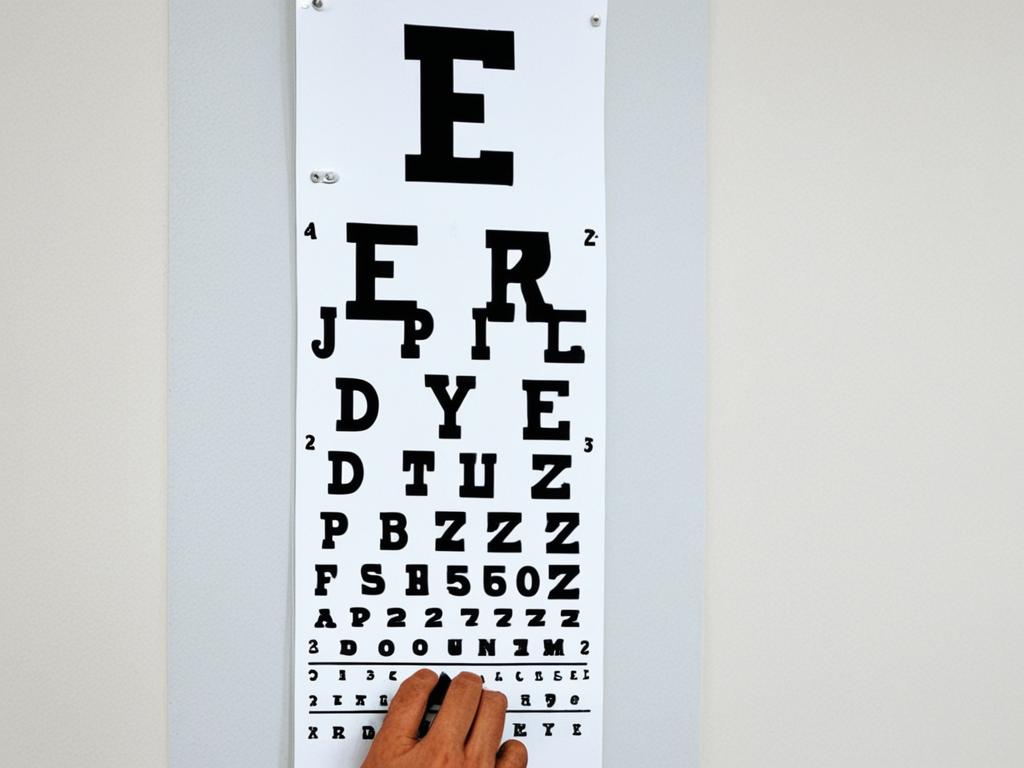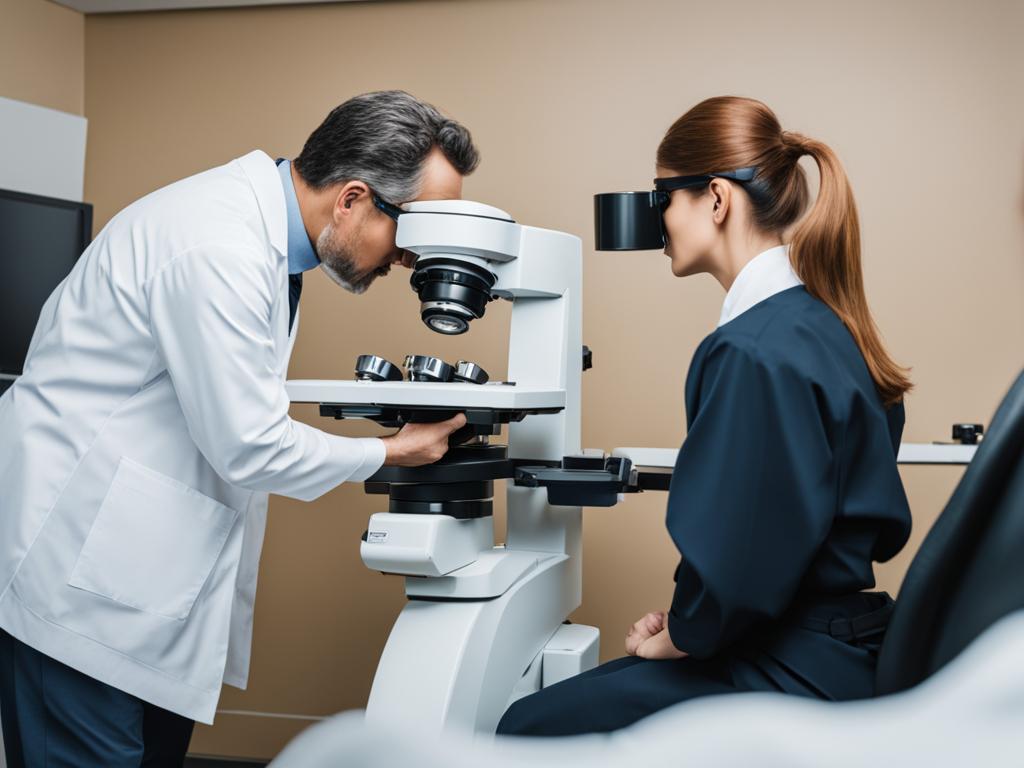Eye Care and Cure: Essential Vision Health Tips
Your eyes are precious and essential for navigating the world around you. That’s why taking care of your vision health should be a top priority. Regular check-ups with an eye doctor are crucial for identifying and treating potential eye diseases early on. But there are also practical steps you can take to maintain optimal vision health on a daily basis.
Whether you’re concerned about common eye conditions or simply want to ensure the longevity of your eyesight, this article will provide you with valuable information and tips to help you take good care of your eyes. From eye care habits to preventive measures, we’ve got you covered.
Key Takeaways:
- Regular check-ups with an eye doctor are crucial for early detection and treatment of eye diseases.
- Maintain a balanced diet rich in fruits, vegetables, and omega-3 fatty acids to support optimal vision health.
- Protect your eyes from harmful UV radiation by wearing sunglasses that block 99-100% of UV-A and UV-B rays.
- Be mindful of your family medical history and other risk factors for eye diseases.
- Give your eyes breaks when using digital devices by following the 20-20-20 rule.
Eye Care Tips for Healthy Eyes
Taking care of your eyes is essential for maintaining optimal eye health. Here are some valuable eye care tips that can help you keep your eyes healthy:
- Follow a balanced diet: Include a variety of fruits, vegetables, and omega-3 fatty acid-rich foods like salmon in your diet. These foods provide essential nutrients that promote eye health.
- Manage your weight: Maintaining a healthy weight can reduce the risk of diabetes-related eye conditions, such as diabetic retinopathy.
- Stay physically active: Engaging in regular physical activity is crucial for overall health, including your eyes. It can help prevent vision-impacting conditions like diabetes, high blood pressure, and high cholesterol.
- Protect your eyes from UV radiation: Wear sunglasses that block 99-100% of UV-A and UV-B radiation whenever you are exposed to sunlight. This helps protect against cataracts and age-related macular degeneration.
- Use protective eyewear: When participating in certain sports or engaging in potentially hazardous activities, such as woodworking or home repairs, wear protective eyewear to prevent eye injuries.
- Avoid smoking: Smoking increases the risk of age-related eye diseases, including macular degeneration and cataracts. Quitting smoking or never starting can help protect your eyes.
- Know your family medical history: Certain eye diseases have a genetic component. Understanding your family’s medical history can help identify potential risks and allow for proactive measures.
- Take precautions with contact lenses: If you wear contact lenses, follow proper hygiene practices to prevent eye infections. Clean and store them as recommended by your eye care professional.
- Give your eyes breaks from digital devices: Prolonged screen time can lead to digital eye strain. Follow the 20-20-20 rule: every 20 minutes, take a 20-second break and look at something 20 feet away to reduce eye strain.
Importance of Eye Tests and Exams
Regular eye tests and exams play a crucial role in maintaining overall eye health. It is important to understand that certain eye diseases may not exhibit noticeable symptoms until they reach advanced stages. This makes early detection through comprehensive eye exams essential for timely treatment.
The comprehensive dilated eye exam is considered the gold standard for detecting eye diseases early. This comprehensive exam includes a series of tests such as visual field tests, visual acuity tests, tonometry, and dilation. These tests help in assessing the overall health of your eyes, identifying vision problems, and detecting various eye diseases.
The frequency of eye exams may vary based on factors such as age, race, and overall health. Children should undergo regular vision screenings to ensure optimal visual development. On the other hand, adults may require more comprehensive exams to monitor their eye health. It is important to consult with your healthcare provider or eye care professional to determine the appropriate frequency of eye exams based on your specific needs.
To emphasize the importance of eye tests and exams, consider the following quote:
“Regular eye exams are like preventive maintenance for your eyes. They help catch potential problems early on and provide an opportunity for timely intervention and treatment.” – Dr. Anna Thompson, Optometrist
An informative table highlighting the recommended frequency of eye exams based on age groups:
| Age Group | Recommended Frequency of Eye Exams |
|---|---|
| Infants and Toddlers | First exam at 6 months, followed by regular exams as recommended by the healthcare provider |
| Children and Teenagers | At least one exam between the ages of 3 and 5, and annual exams thereafter |
| Adults (18-60 years) | Every two years or as recommended by the healthcare provider |
| Seniors (60 years and older) | Annual exams or as recommended by the healthcare provider |

Remember, proactive eye care through regular eye tests and exams is vital for early detection and timely management of eye conditions. It is an investment in your vision health that can help prevent vision problems and preserve your visual acuity for years to come.
Prevention and Disease Management
Taking steps to prevent eye diseases is essential. While certain diseases cannot be cured, regular exams and discussing family history can help anticipate and manage conditions like glaucoma and diabetes-related eye problems. By effectively managing these diseases, the risk of vision loss can be minimized.
One of the key measures to prevent eye diseases is to prioritize regular eye exams. By scheduling routine check-ups with your eye doctor, you can identify and address potential issues early on. During these exams, your eye doctor will conduct various tests to assess your vision and detect any signs of eye diseases.
Additionally, discussing your family history with your eye doctor is crucial. Certain eye diseases, such as glaucoma, have a genetic component. By understanding your family’s eye health history, your eye doctor can determine if you are at a higher risk and develop a more personalized prevention plan.
Glaucoma Prevention
Glaucoma is a serious eye condition that can lead to vision loss if left untreated. While it cannot be cured, there are steps you can take to manage and prevent its progression:
- Attend regular eye exams to monitor your eye pressure and detect any changes in your optic nerve.
- Follow your doctor’s prescribed treatment plan, which may include medication, eye drops, or surgery.
- Avoid smoking, as it can increase your risk of developing glaucoma.
- Maintain a healthy lifestyle by exercising regularly and eating a balanced diet.
By following these preventive measures and closely working with your eye doctor, you can significantly reduce the risk of vision loss due to glaucoma.
Diabetes-Related Eye Problems
For individuals with diabetes, managing the condition is crucial to prevent eye problems. High blood sugar levels can damage the blood vessels in the retina, leading to a condition called diabetic retinopathy. To minimize the risk of diabetes-related eye problems:
- Control your blood sugar levels through medication, diet, and regular exercise.
- Monitor your blood pressure and cholesterol levels, as high levels can further contribute to eye complications.
- Attend regular eye exams to detect any early signs of diabetic retinopathy or other diabetes-related eye conditions.
- Follow your doctor’s recommendations for managing your diabetes to minimize the impact on your vision.
By effectively managing diabetes and working closely with your healthcare team, you can reduce the risk of vision loss caused by diabetes-related eye problems.
| EYE DISEASE | DESCRIPTION | PREVENTION |
|---|---|---|
| Glaucoma | A condition characterized by damage to the optic nerve, often associated with increased eye pressure. |
|
| Diabetic Retinopathy | A complication of diabetes that affects the blood vessels in the retina, potentially causing vision loss. |
|
Importance of Prescribed Lenses and Protective Eyewear
Wearing the correct prescription lenses or undergoing corrective surgery is essential for maintaining eye comfort and preventing eyestrain, headaches, and injuries. When it comes to protecting your eyes from harmful UV radiation, prescription sunglasses, UV-blocking contact lenses, and clip-on sunglasses are excellent options.
Prescription lenses are specially customized to correct your unique vision needs. By wearing prescription lenses, you can see clearly and comfortably, reducing eye strain and improving overall visual experience.
In addition, UV-blocking contact lenses offer convenient protection against harmful ultraviolet rays. They not only correct your vision but also shield your eyes from potentially damaging UV radiation.
Using protective eyewear is crucial during work or sports activities to reduce the risk of eye injury and vision impairment. Safety goggles, glasses, and face shields provide a protective barrier, preventing external objects from entering the eyes and causing harm.
When participating in sports, especially those with a high risk of eye injury, such as racquetball or basketball, wearing sports goggles is highly recommended. Sports goggles have polycarbonate lenses that are impact-resistant, minimizing the risk of injury from fast-moving objects or collisions.
By prioritizing the use of prescription lenses and protective eyewear, you can safeguard your eyes from potential harm and maintain optimal eye health.
Now, let’s take a look at the benefits of protecting your eyes from digital devices and preventing digital eye strain.

| Benefits of Protective Eyewear | Benefits of Prescription Lenses |
|---|---|
|
|
Digital Eye Strain Prevention
Staring at screens for extended periods can lead to digital eye strain. To prevent this, follow these tips:
- Ensure your prescription for glasses or contacts is up to date.
- Use computer glasses if needed.
- Position your screen to reduce glare.
- Use an anti-glare screen if necessary.
- Choose a comfortable chair and maintain proper posture.
- Blink frequently or use artificial tears for dry eyes.
- Take regular breaks to rest your eyes.
By implementing these measures, you can reduce the risk of digital eye strain and promote healthier screen habits.
Importance of Regular Eye Exams
Regular eye exams are critical for maintaining good vision and detecting eye diseases that may not show symptoms. These exams, performed by optometrists and ophthalmologists, involve a comprehensive evaluation of your eye health to ensure proper vision correction and identify any underlying eye conditions.
“Regular eye exams are essential in preventing vision problems and catching eye diseases early on. They allow us to assess your overall eye health, provide necessary vision correction, and offer treatments for various eye conditions.” – Dr. Emily Johnson, Optometrist
During a regular eye exam, your eye care professional will discuss your medical history and any concerns you may have regarding your vision. They will then perform various tests, including vision acuity tests, eye pressure checks, and external and internal eye examinations. These tests help evaluate your visual function and detect potential eye diseases, such as glaucoma, age-related macular degeneration, and cataracts.
Early detection of eye diseases is crucial as it allows for timely intervention and treatment, minimizing the risk of vision loss. Regular eye exams also ensure that your vision correction needs are met and that you are wearing the appropriate prescription lenses or undergoing any necessary vision correction procedures.

Benefits of Regular Eye Exams:
- Early detection and treatment of eye diseases
- Prevention of vision loss
- Proper vision correction
- Monitoring of eye health for overall well-being
By prioritizing regular eye exams, you are taking proactive steps towards maintaining good vision and preventing potential eye problems. Remember, your eye health is just as important as your overall well-being, so don’t overlook the significance of regular eye care.
Eye Protection from the Sun and Hazards
Protecting your eyes from the sun’s harmful UV rays and potential hazards is crucial for maintaining optimal eye health. Exposure to UV radiation can lead to various eye conditions, including cataracts and macular degeneration. To safeguard your eyes, it is important to take preventive measures and utilize appropriate protective gear.
One effective way to protect your eyes from UV rays is by wearing sunglasses with UV-blocking capabilities. Look for sunglasses that offer 99-100% protection against both UV-A and UV-B radiation. Consider opting for wraparound lenses or polarized lenses, as they provide additional coverage and reduce glare. By shielding your eyes from UV radiation, you can minimize the risk of developing eye problems in the future.

Furthermore, it is crucial to wear appropriate protective gear when working with hazardous materials or participating in certain sports. Safety glasses or goggles are essential for preventing eye injuries in potentially risky environments. They form a protective barrier, shielding your eyes from potential harm.
Below is a table summarizing the importance of eye protection from the sun and hazards:
| Benefits | Protective Measures |
|---|---|
| Prevention of eye conditions such as cataracts and macular degeneration | – Wearing sunglasses with UV-blocking capabilities – Opting for wraparound lenses or polarized lenses – Using safety glasses or goggles in hazardous environments |
| Reduction of UV radiation exposure | – Choosing sunglasses that block 99-100% of UV-A and UV-B radiation |
| Minimization of eye injury risks | – Utilizing appropriate protective gear, such as safety glasses or goggles |
By prioritizing eye protection from the sun’s harmful UV rays and potential hazards, you can safeguard your vision and maintain long-term eye health.
Importance of Disease Prevention
Preventing eye diseases through regular check-ups and discussing family history is crucial in identifying and managing conditions such as glaucoma and age-related macular degeneration. While some eye diseases do not have a cure, medical advances have significantly improved the treatments available for conditions like cataracts and age-related macular degeneration.
| Disease | Prevention Methods |
|---|---|
| Glaucoma |
|
| Age-related Macular Degeneration |
|
| Cataracts |
|
By prioritizing disease prevention and implementing these measures, individuals can significantly reduce the risk of developing severe eye conditions and preserve their vision for years to come.

Protecting Eyes at Work and Sports
When it comes to safeguarding your eyes, wearing appropriate protective eyewear is crucial, especially in work and sports environments. By using specialized safety gear and sports goggles, you can prevent eye injuries and maintain good vision. Here are some effective eye protection options:
Safety Glasses
Safety glasses are a common form of eye protection in various work settings. They are designed to shield your eyes from flying debris, chemicals, and other potential hazards. With impact-resistant lenses, safety glasses provide reliable protection throughout the day.
Goggles
Goggles offer a higher level of eye protection, covering a larger portion of your eye area. They create a protective seal around your eyes, minimizing the risk of debris, liquids, or chemicals entering your eyes. Goggles are particularly beneficial in laboratories, construction sites, and other environments where there is a higher chance of eye hazards.
Helmets with Face Masks
In certain sports, such as football, hockey, and lacrosse, helmets with face masks are crucial for protecting both your head and eyes. These helmets provide a hard shell to shield against impact, while the face mask adds an extra barrier to prevent injuries to your eyes.
Sports Goggles with Polycarbonate Lenses
Sports goggles are specifically designed to withstand high-impact activities while providing optimal vision clarity. The polycarbonate lenses used in sports goggles are highly durable and can withstand hard hits, ensuring your eyes remain protected during sports such as basketball, racquetball, or skiing.
By investing in the right eye protection gear, you can minimize the risk of eye injuries and maintain good vision at work and during sports activities.

Conclusion
Prioritizing eye care is essential for maintaining optimal vision health. By following the vision health tips outlined in this article, you can take proactive steps towards protecting your eyes and preventing vision problems. Remember, prevention is the key to long-term eye health.
Regular eye exams are critical for detecting eye diseases early and addressing any vision issues. Consulting with healthcare professionals, such as optometrists and ophthalmologists, can provide personalized advice and recommendations specific to your needs.
In addition to regular check-ups, adopting preventive measures like maintaining a balanced diet, wearing protective eyewear, and practicing good eye hygiene can significantly contribute to preserving your vision. Remember to prioritize eye care and incorporate these tips into your daily routine for optimal eye health and well-being.
FAQ
Why is eye care important?
Eye care is important because your eyes are vital for navigating the world around you. Taking care of your eyes can help maintain optimal vision health and prevent eye diseases.
What are some tips for maintaining healthy eyes?
Some tips for maintaining healthy eyes include maintaining a balanced diet, managing weight, staying physically active, wearing sunglasses, using protective eyewear, avoiding smoking, knowing your family medical history, taking precautions with contact lenses, and giving your eyes breaks when using digital devices.
How often should I get my eyes tested?
The frequency of eye tests depends on various factors such as age, race, and overall health. Children should have regular vision screenings, while adults may require more comprehensive exams. Consult with your healthcare provider for personalized recommendations.
Can eye diseases be cured?
Some eye diseases do not have a cure, but early detection and treatment can help manage and minimize the risk of vision loss. Regular eye exams and discussing your family medical history can help anticipate and manage conditions such as glaucoma and diabetes-related eye problems.
Why is it important to wear prescription lenses or undergo corrective surgery?
Wearing the correct prescription lenses or undergoing corrective surgery is essential for maintaining eye comfort, preventing eyestrain, headaches, and injuries. Prescription sunglasses, UV-blocking contact lenses, and clip-on sunglasses provide extra protection from harmful UV radiation.
How can I prevent digital eye strain?
To prevent digital eye strain, ensure your prescription for glasses or contacts is up to date, use computer glasses if needed, position your screen to reduce glare, use an anti-glare screen if necessary, choose a comfortable chair and maintain proper posture, blink frequently or use artificial tears for dry eyes, and take regular breaks to rest your eyes.
Why are regular eye exams important?
Regular eye exams are critical for maintaining good vision, detecting eye diseases, and ensuring proper vision correction. Optometrists and ophthalmologists can provide general eye care, vision correction, and treatments for eye diseases.
How can I protect my eyes from the sun and hazards?
Wearing sunglasses with UV-blocking capabilities, wraparound lenses, or polarized lenses can protect your eyes from the sun’s harmful UV rays. Additionally, using safety glasses or goggles when working with hazardous materials or participating in certain sports significantly reduces the risk of eye injuries.
Can eye diseases be prevented?
While some eye diseases cannot be prevented, regular check-ups, discussing family history, and adopting preventive measures can help identify and manage conditions like glaucoma and age-related macular degeneration. Medical advancements have also improved treatments for conditions such as cataracts and age-related macular degeneration.
How can I protect my eyes at work and during sports?
Wearing appropriate protective eyewear, such as safety glasses, goggles, helmets with face masks, and sports goggles with polycarbonate lenses, is crucial for preventing eye injuries and maintaining good vision while working with hazardous materials or participating in sports.




